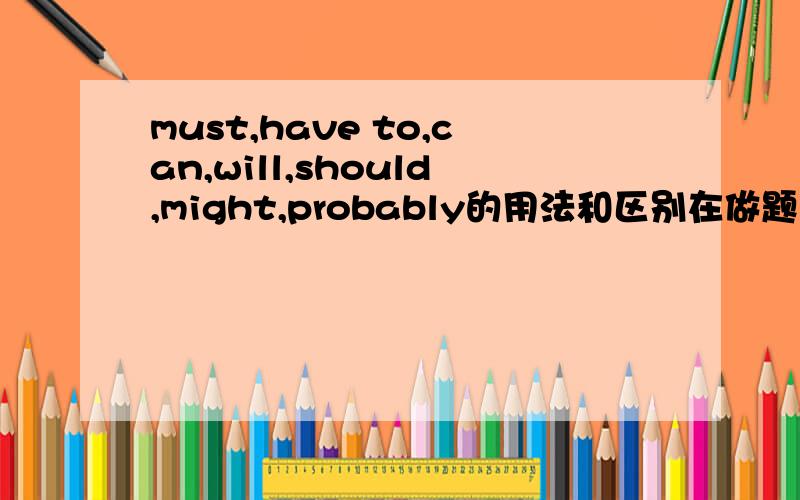must,have to,can,will,should,might,probably的用法和区别在做题的时候应该注意些什么?
来源:学生作业帮助网 编辑:作业帮 时间:2024/11/27 19:42:36

must,have to,can,will,should,might,probably的用法和区别在做题的时候应该注意些什么?
must,have to,can,will,should,might,probably的用法和区别
在做题的时候应该注意些什么?
must,have to,can,will,should,might,probably的用法和区别在做题的时候应该注意些什么?
情态动词有can (could), may (might), must, have to, shall (should, will (would), dare (dared), need (needed), ought to等. 情态动词无人称和数的变化;不能单独使用,必须与其后的动词原形构成谓语
一、 can, could
1) 表示能力(体力、知识、技能).
Can you lift this heavy box?(体力)
Mary can speak three languages.(知识)
Can you skate?(技能)
此时可用be able to代替.Can只有一般现在时和一般过去式;而be able to则有更多的时态.
I’ll not be able to come this afternoon.
当表示“经过努力才得以做成功某事”时应用be able to,不能用Can.如:
He was able to go to the party yesterday evening in spite of the heavy rain.
2) 表示请求和允许.
-----Can I go now?
----- Yes, you can. / No, you can’t.
此时可与may互换.在疑问句中还可用could,
might代替,不是过去式,只是语气更委婉,不能用于肯定句和答语中.
---- Could I come to see you tomorrow?
---- Yes, you can. ( No, I’m afraid not. )
3) 表示客观可能性(客观原因形成的能力).
They’ve changed the timetable, so we can go by bus instead.
This hall can hold 500 people at least.
4) 表示推测(惊讶、怀疑、不相信的态度),用于疑问句、否定句和感叹句中.
Can this be true?
This can’t be done by him.
How can this be true?
二、 may, might
1) 表示请求和允许.might比 may语气更委婉,而不是过去式.否定回答时可用can’t
或mustn’t,表示“不可以,禁止”.
----Might/ May I smoke in this room?
---- No, you mustn’t.
---- May/Might I take this book out of the room?
---- Yes, you can. (No, you can’t / mustn’t. )
用May I...?征徇对方许可时比较正式和客气,而用Can I...?在口语中更常见.
2)用于祈使句,表示祝愿.
May you succeed!
3) 表示推测、可能性(不用于疑问句).
might不是过去式,它所表示的可能性比may小.
1.He may /might be very busy now.
2.Your mother may /might not know the truth.
三、 must, have to
1) 表示必须、必要.
You must come in time.
在回答引出的问句时,如果是否定的,不能用mustn’t(禁止,不准),而用needn’t, don’t have to(不必).
---- Must we hand in our exercise books today?
---- Yes, you must.
---- No, you don’t have to / you needn’t.
2) must是说话人的主观看法, 而have to则强调客观需要.Must只有一般现在时, have to 有更多的时态形式.
1. he play isn’t interesting, I really must go now.
2. I had to work when I was your age.
3) 表示推测、可能性(只用于肯定的陈述句)
1. You’re Tom’s good friend, so you must know what he likes best.
2. Your mother must be waiting for you now.
四、 dare, need
1) dare作情态动词用时, 常用于疑问句、否定句和条件从句中, 过去式形式为dared.
1. How dare you say I’m unfair?
2. He daren’t speak English before such a crowd, dare he?
3. If we dared not go there that day, we couldn’t get the beautiful flowers.
2) need 作情态动词用时, 常用于疑问句、否定句.在肯定句中一般用must, have to, ought to, should代替.
1.You needn’t come so early.
2. ---- Need I finish the work today?
---- Yes, you must. / No, you needn’t.
3) dare和 need作实义动词用时, 有人称、时态和数的变化.在肯定句中,dare后面常接带to的不定式.在疑问句和否定句中,dare后面可接带to或不带to的不定式.而need后面只能接带to的不定式.
1. I dare to swim across this river.
2. He doesn’t dare (to) answer.
3. He needs to finish his homework today.
五、 shall, should
1) shall 用于第一人称,征求对方的意见.
What shall we do this evening?
2) shall 用于第二、三人称,表示说话人给对方的命令、警告、允诺或威胁.
1. You shall fail if you don’t work hard.(警告)
2. He shall have the book when I finish it.(允诺)
3. He shall be punished.(威胁)
六、 will, would
1) 表示请求、建议等,would更委婉.
Will / Would you pass me the ball, please?
2) 表示意志、愿望和决心.
1. I will never do that again.
2. They asked him if he would go abroad.
3) would表示过去反复发生的动作或某种倾向.would表示过去习惯时比used to正式,且没有“现已无此习惯”的含义.
1. During the vacation, he would visit me every other day.
2. The wound would not heal.
4) 表示估计和猜想.
It would be about ten o’clock when she left home.
七、 should, ought to
1) should, ought to表示“应该”,ought to表示义务或责任,比should语气重.
1. I should help her because she is in trouble.
2. You ought to take care of the baby.
2) 表示劝告、建议和命令.should, ought to可通用,但在疑问句中常用should.
1. You should / ought to go to class right away.
2. Should I open the window?
3) 表示推测
should , ought to (客观推测), must(主观推测).
1.He must be home by now. (断定他已到家)
2.He ought to/should be home by now.(不太肯定)
3. This is where the oil must be.(直爽)
4. This is where the oil ought to/should be.(含蓄)
1) 除ought和used以外,其他情态动词后面只能接不带to的不定式。如果我们把ought to和used to看做是固定词组的话,那么,所有情态动词无一例外地只能接不带to的不定式:
We used to grow beautiful roses.
I asked if he would come and repair my television set.
全部展开
1) 除ought和used以外,其他情态动词后面只能接不带to的不定式。如果我们把ought to和used to看做是固定词组的话,那么,所有情态动词无一例外地只能接不带to的不定式:
We used to grow beautiful roses.
I asked if he would come and repair my television set.
2) 情态助动词在限定动词词组总是位居第一:
They need not have been punished so severely.
3) 情态助动词用于第三人称单数现在时的时候,没有词形变化,即其词尾无-s形式:
She dare not say what she thinks.
4) 情态动词没有非限定形式,即没有不定式和分词形式,也没有相应的动名词:
Still, she needn't have run away.
5) 情态助动词的“时”的形式并不是时间区别的主要标志。在不少场合,情态助动词的现在时和过去时形式都可以表示现在、过去或将来时间:
Would you mind very much if I ask you to do something?
She told him he ought not to have done it.
6) 情态助动词之间是相互排斥的,即在一个限定动词词组中只能出现一个情态助动词,但有时却可以与have和be基本助动词连用:
收起
的vc